
PD-L1 Provides Valid Biomarker for Nivolumab/Chemo in Gastric Cancer

In a discussion with Targeted Oncology, Michael Gibson, MD, PhD, discusses the benefits of using a patient’s PD-L1 combined positive score to determine if they are given nivolumab and chemotherapy to treat their gastric cancer.
CASE
- A 60-year-old man had abrupt 10-pound weight loss, dyspepsia, bloating after meals, and loss of appetite. All symptoms got worse over the next 3 months.
- Family history: father deceased at age 50 due to gastric cancer
- Medical history: overweight, hypertension
- Esophagogastroduodenoscopy (EGD) showed 2-cm protruding mass in the body of the stomach, without ulceration.
- Biopsy revealed poorly differentiated adenocarcinoma.
- Molecular testing: HER2/neu negative; mismatched repair proteins (MMRp) were microsatellite stable; PD-L1 combined positive score was 5%
- CT of abdomen and chest revealed a gastric polypoid mass and thickening; no ascites; 2 lesions seen in the left lung lower lobe.
- Lung biopsy confirmed metastatic adenocarcinoma consistent with gastric primary cancer.
- PET/CT confirmed metastatic disease.
- Diagnosis: stage IV gastric adenocarcinoma
- The patient was started on FOLFOX (leucovorin calcium [folinic acid], fluorouracil, and oxaliplatin) plus nivolumab (Opdivo).
Targeted Oncology: What are some of the trials that make up relevant data for the use of nivolumab and chemotherapy in this patient population?
MICHAEL GIBSON, MD, PhD: Despite all the [approved] options for these patients, the data to support them are very repetitive. For patients with esophageal squamous cell carcinoma, [the trial that led to the approval of nivolumab and chemotherapy for these patients was] CheckMate 648 [NCT03143153].1 In both squamous and non-squamous disease KEYNOTE-590 [NCT03189719] led to the approval for pembrolizumab [Keytruda] plus chemotherapy.2
What was notable from the CheckMate 649 (NCT02872116) study outcomes?
The randomization of this trial was straightforward; [patients were on either] chemotherapy alone or nivolumab plus or minus chemotherapy, and the primary end points [were overall survival (OS) and progression-free survival (PFS) in patients with a PD-L1 combined positive score (CPS) of 5 or more].3 At 3-years [of follow-up], the median OS and PFS [in the combination arm] were higher for those with a CPS of 5 or more [compared with] the entire randomized population.4 [This was at 14.4 months (95% CI, 13.1-16.2) vs 13.7 months (95% CI, 12.4-14.5) and 8.3 months (95% CI, 7.0-9.3) vs 7.7 months (95% CI, 7.1-8.6), respectively].4 This showed the validity of CPS as a marker for this patient population.
How are the patient’s quality-of-life outcomes impacted by this combination?
Quality-of-life [measurements have] tremendous importance...and these were collected in the CheckMate 649 trial.... As the treatments went on, the numbers [corresponding to the patient's] quality of life got better.5 Looking at safety, just like in all the immunotherapy vs chemotherapy studies, the difference in toxicity is in the immune-related adverse events [irAEs]....3 There are irAEs that go away with [extra treatment] and there are ones that don’t.... I would be curious to see data that suggests the patients who are treated with prednisone got better [compared with] those who didn't, but I haven't been able to find those sort of data presented in that way.
References:
1. FDA approves Opdivo in combination with chemotherapy and Opdivo in combination with Yervoy for first-line esophageal squamous cell carcinoma indications. FDA. News Release. May 31, 2022. Accessed February 28, 2024.
2. FDA approves pembrolizumab for esophageal or GEJ carcinoma. FDA. News Release. March 22, 2021. Accessed February 28, 2024.
3. Janjigian YY, Shitara K, Moehler M, et al. First-line nivolumab plus chemotherapy versus chemotherapy alone for advanced gastric, gastro-oesophageal junction, and oesophageal adenocarcinoma (CheckMate 649): a randomised, open-label, phase 3 trial. Lancet. 2021;398(10294):27-40. doi:10.1016/S0140-6736(21)00797-2
4. Janjigian YY, Ajani JA, Moehler M, et al. First-line nivolumab plus chemotherapy for advanced gastric, gastroesophageal junction, and esophageal adenocarcinoma: 3-year follow-up of the phase III CheckMate 649 trial. J Clin Oncol. 2024: JCO2301601. doi:10.1200/JCO.23.01601
5. Moehler M, Xiao H, Blum SI, et al. Health-related quality of life with nivolumab plus chemotherapy versus chemotherapy in patients with advanced gastric/gastroesophageal junction cancer or esophageal adenocarcinoma from CheckMate 649. J Clin Oncol. 2023;41(35):5388-5399. doi:10.1200/JCO.23.00170








































